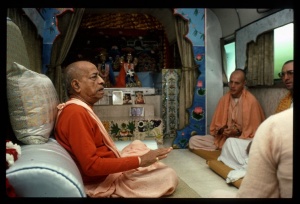SB 9.8.5-6: Difference between revisions
m (1 revision(s)) |
(Vanibot #0018 edit: make synonym terms in Sanskrit italic in SB - Vanisource) |
||
| Line 1: | Line 1: | ||
{{info | {{info | ||
|speaker= | |speaker=Śukadeva Gosvāmī | ||
|listener=King | |listener=King Parīkṣit | ||
}} | }} | ||
[[Category:Srimad-Bhagavatam - Canto 09 Chapter 08|s05-06 ]] | |||
[[Category:Bhagavatam Verses Spoken by Sukadeva Gosvami - Vanisource|090805]] | |||
<div style="float:left">'''[[Srimad-Bhagavatam]] - [[SB 9|Ninth Canto]] - [[SB 9.8: The Sons of Sagara Meet Lord Kapiladeva|Chapter 8: The Sons of Sagara Meet Lord Kapiladeva]]'''</div> | |||
<div style="float:right">[[File:Go-previous.png|link=SB 9.8.4]] '''[[SB 9.8.4]] - [[SB 9.8.7]]''' [[File:Go-next.png|link=SB 9.8.7]]</div> | |||
{{RandomImage}} | |||
==== TEXTS 5-6 ==== | ==== TEXTS 5-6 ==== | ||
<div | <div class="verse"> | ||
yas tālajaṅghān yavanāñ | :yas tālajaṅghān yavanāñ | ||
chakān haihaya-barbarān | :chakān haihaya-barbarān | ||
nāvadhīd guru-vākyena | :nāvadhīd guru-vākyena | ||
cakre vikṛta-veṣiṇaḥ | :cakre vikṛta-veṣiṇaḥ | ||
muṇḍāñ chmaśru-dharān kāṁścin | |||
mukta-keśārdha-muṇḍitān | :muṇḍāñ chmaśru-dharān kāṁścin | ||
anantar-vāsasaḥ kāṁścid | :mukta-keśārdha-muṇḍitān | ||
abahir-vāsaso 'parān | :anantar-vāsasaḥ kāṁścid | ||
:abahir-vāsaso 'parān | |||
</div> | </div> | ||
| Line 21: | Line 27: | ||
==== SYNONYMS ==== | ==== SYNONYMS ==== | ||
<div | <div class="synonyms"> | ||
''yaḥ''—Mahārāja Sagara who; ''tālajaṅghān''—the uncivilized clan named Tālajaṅgha; ''yavanān''—persons averse to the Vedic literature; ''śakān''—another class of atheist; ''haihaya''—the uncivilized; ''barbarān''—and the Barbaras; ''na''—not; ''avadhīt''—did kill; ''guru-vākyena''—by the order of his spiritual master; ''cakre''—made them; ''vikṛta-veṣiṇaḥ''—dressed awkwardly; ''muṇḍān''—shaved clean; ''śmaśru-dharān''—wearing mustaches; ''kāṁścit''—some of them; ''mukta-keśa''—loose hair; ''ardha-muṇḍitān''—half-shaven; ''anantaḥ-vāsasaḥ''—without underwear; ''kāṁścit''—some of them; ''abahiḥ-vāsasaḥ''—without covering garments; ''aparān''—others. | |||
</div> | </div> | ||
| Line 28: | Line 34: | ||
==== TRANSLATION ==== | ==== TRANSLATION ==== | ||
<div | <div class="translation"> | ||
Sagara Mahārāja, following the order of his spiritual master, Aurva, did not kill the uncivilized men like the Tālajaṅghas, Yavanas, Śakas, Haihayas and Barbaras. Instead, some of them he made dress awkwardly, some of them he shaved clean but allowed to wear mustaches, some of them he left wearing loose hair, some he half shaved, some he left without underwear, and some without external garments. Thus these different clans were made to dress differently, but King Sagara did not kill them. | Sagara Mahārāja, following the order of his spiritual master, Aurva, did not kill the uncivilized men like the Tālajaṅghas, Yavanas, Śakas, Haihayas and Barbaras. Instead, some of them he made dress awkwardly, some of them he shaved clean but allowed to wear mustaches, some of them he left wearing loose hair, some he half shaved, some he left without underwear, and some without external garments. Thus these different clans were made to dress differently, but King Sagara did not kill them. | ||
</div> | </div> | ||
__NOTOC__ | |||
<div style="float:right; clear:both;">[[File:Go-previous.png|link=SB 9.8.4]] '''[[SB 9.8.4]] - [[SB 9.8.7]]''' [[File:Go-next.png|link=SB 9.8.7]]</div> | |||
__NOTOC__ | |||
__NOEDITSECTION__ | |||
Revision as of 09:15, 1 December 2017

A.C. Bhaktivedanta Swami Prabhupada
TEXTS 5-6
- yas tālajaṅghān yavanāñ
- chakān haihaya-barbarān
- nāvadhīd guru-vākyena
- cakre vikṛta-veṣiṇaḥ
- muṇḍāñ chmaśru-dharān kāṁścin
- mukta-keśārdha-muṇḍitān
- anantar-vāsasaḥ kāṁścid
- abahir-vāsaso 'parān
SYNONYMS
yaḥ—Mahārāja Sagara who; tālajaṅghān—the uncivilized clan named Tālajaṅgha; yavanān—persons averse to the Vedic literature; śakān—another class of atheist; haihaya—the uncivilized; barbarān—and the Barbaras; na—not; avadhīt—did kill; guru-vākyena—by the order of his spiritual master; cakre—made them; vikṛta-veṣiṇaḥ—dressed awkwardly; muṇḍān—shaved clean; śmaśru-dharān—wearing mustaches; kāṁścit—some of them; mukta-keśa—loose hair; ardha-muṇḍitān—half-shaven; anantaḥ-vāsasaḥ—without underwear; kāṁścit—some of them; abahiḥ-vāsasaḥ—without covering garments; aparān—others.
TRANSLATION
Sagara Mahārāja, following the order of his spiritual master, Aurva, did not kill the uncivilized men like the Tālajaṅghas, Yavanas, Śakas, Haihayas and Barbaras. Instead, some of them he made dress awkwardly, some of them he shaved clean but allowed to wear mustaches, some of them he left wearing loose hair, some he half shaved, some he left without underwear, and some without external garments. Thus these different clans were made to dress differently, but King Sagara did not kill them.